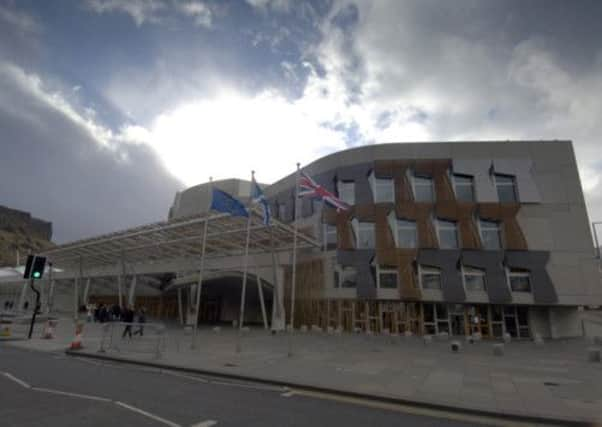George Kerevan: Devolved tax step in right direction


I CHOKED in my porridge, metaphorically at least. According to the report from Labour’s (latest) internal commission on the future of devolution, there is a “strong case for devolving income tax in full” to the control of the Scottish Parliament.
As the commission included both Johann Lamont, Scottish Labour leader, and Margaret Curran, the shadow secretary of state, this suggests Labour might be getting serious about offering a counter bid to independence, or at least to the confederal version of Scottish autonomy being offered by the SNP. Could Mohamed and the proverbial mountain be about to meet somewhere in the middle?
Advertisement
Hide AdAdvertisement
Hide AdWell, this is Scottish politics, so don’t uncross your fingers just yet. For a start, the phrase “a strong case” suggests kites are being flown to see if there is any political wind to keep them aloft. The commission is also careful to cover its political rear by saying that no tax reform should be undertaken that threatens the funding of Scottish public services. Which I take to mean: “We’d like to support fiscal autonomy but only if we keep a London Treasury guarantee to pay for the NHS”. And pigs might fly.
However, I am encouraged by this move by the Scottish Labour leadership towards fiscal autonomy for Scotland, even if the move is still just a toe in the water. Regardless of their motives, this is the right reform for Scotland and the Scottish economy.
Devolved income tax powers are hardly new or revolutionary, except in super-centralist Britain. In America you pay state as well as federal income tax, and it has led neither to the secession of California nor wrecked the economy. In New York, normal state income tax runs through bands from 4 to 8.2 per cent, but in 2010 the legislature whacked on a stiff 8.97 per cent on incomes over $500,000 (£327,000) to punish Wall Street bankers. An affluent household in New York pays a marginal income tax rate (federal, state and city) of over 50 per cent. You’d have thought that prospect would get the comrades in Scottish Labour excited.
Scottish Labour’s innate fear of devolved tax powers is based on its belief that Westminster centralisation of finances guarantees both equality of treatment of the regions, and the financial muscle to deal with economic hardship. I don’t dismiss these concerns but I think the proffered solution (Treasury control) does not do what it says on the box.
The main counter argument is economic. We now live in a globalised world of free trade and mass population movements. Regional economies that once were united via metropolitan centres (eg London) now trade directly with the outside world rather than each other. This shift means that one-size-fits-all national tax systems have become a brake on regional economic development. Individual regions need to tailor taxes to local needs.
If this change in fiscal priorities is not recognised, you actually end up with the very inter-regional political tensions the tax centralisers claim they are trying to avoid. This is precisely the situation in Catalonia today. The central government in Madrid controls all tax collection then decides the distribution of revenues to the 17 regions. Catalans pay taxes to Madrid in exchange for a public expenditure grant, much like Holyrood. But Catalonia is the industrial powerhouse of Spain, with a regional GDP bigger than that of Finland. Unfortunately, Madrid also treats Catalonia as a cash cow.
The gap between what Catalonia pays to Madrid and what it gets back amounts to nearly 10 per cent of Catalan GDP. This huge levy means regional administrations in Barcelona have had to raise domestic taxes and borrowing, to fund the local NHS and their own infrastructure. This tax burden falls on local Catalan business. That was manageable as long as Spain remained a relatively closed economy. But globalisation means Catalan car exporters now have to compete in a cutthroat international market, burdened with a regional marginal tax rate of 56 per cent – surpassed only by Sweden and Belgium.
Catalonia can never become globally competitive if it has to carry this heavy fiscal burden. The resulting political tensions are also undermining social cohesion. Perhaps 20 per cent of Catalans are cultural separatists. Another 40 per cent, who resent Madrid’s unfair tax levy, have now joined them.
Advertisement
Hide AdAdvertisement
Hide AdBut if you are a unionist, how do you ensure that any system of devolved income tax does not lead to rich Tory areas refusing to help poorer Labour areas? First, I don’t think you can impose fiscal solidarity by fiat from Brussels or Westminster. English voters are getting restive about not being consulted on fiscal transfers. It is better – from the unionist perspective – to reform the present Barnett system than wait for it to explode.
Second, even if you posit an independent Scotland inside a sterling currency union with the UK, you will still need to find a new, equitable system of managing inter-regional fiscal transfers. One way forward is to agree a formal fiscal solidarity pact between Holyrood (fiscally devolved or independent), Westminster and any other bits of the British Isles that want to join in, for a defined period, say 20 years.
Contracting parties could agree to pool resources to ensure that regional per capita incomes did not fall below a certain defined percentage of the partners’ average per capita GDP. You could build in rules to ensure that the per capita income ranking of net contributors was not so reduced by their contributions as to place it below that of net recipients. You will need some political talking shop to keep the show on the road: either make the House of Lords a regional senate as in Germany, or expand the present Anglo-Irish Council into a Council of the Isles.
Scottish Labour, despite its best intentions, has made a revolutionary gesture over devolving income tax. We should encourage the comrades to go further.